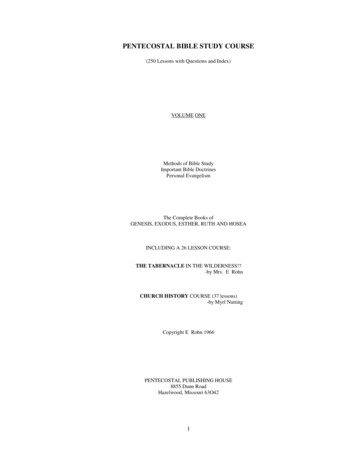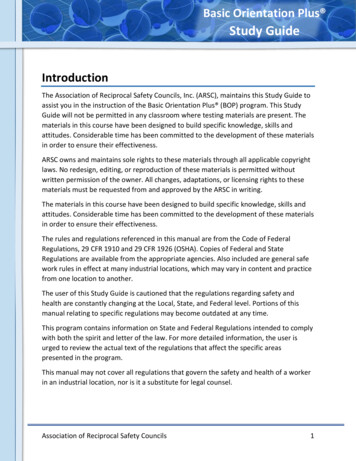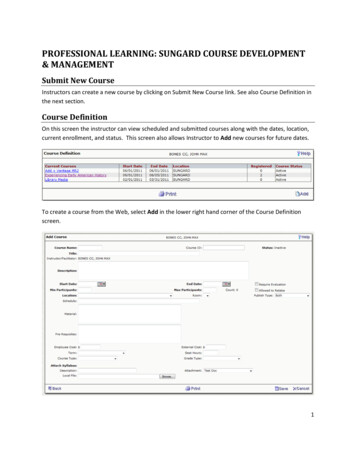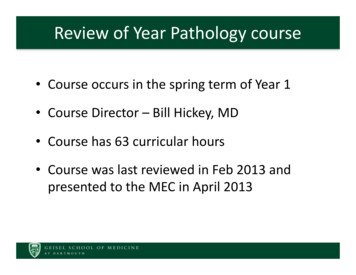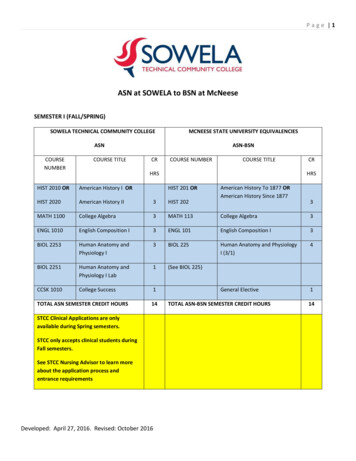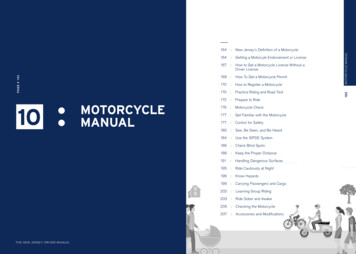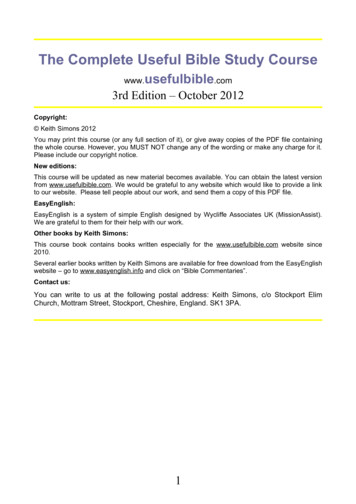
Transcription
The Complete Useful Bible Study Coursewww.usefulbible.com3rd Edition – October 2012Copyright: Keith Simons 2012You may print this course (or any full section of it), or give away copies of the PDF file containingthe whole course. However, you MUST NOT change any of the wording or make any charge for it.Please include our copyright notice.New editions:This course will be updated as new material becomes available. You can obtain the latest versionfrom www.usefulbible.com. We would be grateful to any website which would like to provide a linkto our website. Please tell people about our work, and send them a copy of this PDF file.EasyEnglish:EasyEnglish is a system of simple English designed by Wycliffe Associates UK (MissionAssist).We are grateful to them for their help with our work.Other books by Keith Simons:This course book contains books written especially for the www.usefulbible.com website since2010.Several earlier books written by Keith Simons are available for free download from the EasyEnglishwebsite – go to www.easyenglish.info and click on “Bible Commentaries”.Contact us:You can write to us at the following postal address: Keith Simons, c/o Stockport ElimChurch, Mottram Street, Stockport, Cheshire, England. SK1 3PA.1
Contentswww.usefulbible.comClick on the links below to go directly to any chapter.The Complete Useful Bible Study CourseHebrews: Bible Study and CommentaryHebrews chapter 1Hebrews chapter 2Hebrews chapter 3Hebrews chapter 4Hebrews chapter 5Hebrews chapter 6Hebrews chapter 7Hebrews chapter 8Hebrews chapter 9Hebrews chapter 10Hebrews chapter 11Hebrews chapter 12Hebrews chapter 13Hebrews: a study guideEcclesiastes: Bible Study and CommentaryEcclesiastes chapter 1Ecclesiastes chapter 2Ecclesiastes chapter 3Ecclesiastes chapter 42
Ecclesiastes chapter 5Ecclesiastes chapter 6Ecclesiastes chapter 7Ecclesiastes chapter 8Ecclesiastes chapter 9Ecclesiastes chapter 10Ecclesiastes chapter 11Ecclesiastes chapter 12Ecclesiastes: A study guideEcclesiastes - a 12 week study guide.1 Corinthians: Bible Study and Commentary1 Corinthians chapter 11 Corinthians chapter 21 Corinthians chapter 31 Corinthians chapter 41 Corinthians chapter 51 Corinthians chapter 61 Corinthians chapter 7 NEW!1 Corinthians chapter 8 NEW!1 Corinthians chapter 9 NEW!1 Corinthians chapter 10 NEW!1 Corinthians chapter 11 NEW!Christians have a duty to declare the gospelWhy do so many evil things happen in our world?How much should a church leader say about sin?3
How a church leader can explain about Christ’s deathHow much should a church leader say about Christ’s death?Advice about how to begin a relationship with GodGalatians: Bible Study and CommentaryAbout the Book of GalatiansGalatians chapter 1Galatians chapter 2Galatians chapter 3Galatians chapter 4Galatians chapter 5Galatians chapter 6Word ListPsalms 120 to 134: Bible Study and CommentaryAbout the Songs of AscentPsalm 120Psalm 121Psalm 122Psalm 123Psalm 124Psalm 125Psalm 126Psalm 127Psalm 128Psalm 129Psalm 1304
Psalm 131Psalm 132Psalm 133Psalm 134Psalms 135 and 136; and the Songs of AscentWord List40 days with the Gospel of MarkMarkCelebrity – Day 1 - Mark 1:1-13Authority – Day 2 – Mark 1:14-28Mercy – Day 3 – Mark 1:29-45Empathy – Day 4 – Mark 2:1-17Liberty – Day 5 – Mark 2:18-28Crowds – Day 6 – Mark 3:1-19Enemies – Day 7 – Mark 3:20-35Parables – Day 8 – Mark 4:1-20Results – Day 9 – Mark 4:21-34Storms – Day 10 – Mark 4:35-41Demons – Day 11 – Mark 5:1-20Miracles – Day 12 – Mark 5:21-43Rejection – Day 13 – Mark 6:1-29Provision – Day 14 – Mark 6:30-56Tradition – Day 15 – Mark 7:1-23Liberation – Day 16 – Mark 7:24-37Adulteration – Day 17 – Mark 8:1-21Confession – Day 18 – Mark 8:22-385
Transformation – Day 19 – Mark 9:1-13Liberate – Day 20 – Mark 9:14-32Dominate – Day 21 – Mark 9:33-50Separate – Day 22 – Mark 10:1-31Imitate – Day 23 – Mark 10:32-52Celebrate – Day 24 – Mark 11:1-11Authenticate – Day 25 – Mark 11:12-33Debate – Day 26 – Mark 12:1-27Honour – Day 27 – Mark 12:28-44Rumour – Day 28 – Mark 13:1-23Hour – Day 29 – Mark 13:24-37Fervour – Day 30 – Mark 14:1-11Saviour – Day 31 – Mark 14:12-31Capture – Day 32 – Mark 14:32-52Candour – Day 33 – Mark 14:53-65Denying – Day 34 – Mark 14:66-72Judging – Day 35 – Mark 15:1-20Mocking – Day 36 – Mark 15:21-32Dying – Day 37 – Mark 15:33-41Burying – Day 38 – Mark 15:42-47Waiting – Day 39 – Mark 16:1-8Rising – Day 40 – Mark 16:9-20A prayerAppendix: Worship Songs6
Hebrews: Bible Study and CommentaryJesus, our chief priestA Bible Study in EasyEnglish (2800 word vocabulary) on the Book of HebrewsKeith SimonsEasyEnglish is a system of simple English designed by Wycliffe Associates (UK).Hebrews chapter 1The Old Testament is about Jesus(Hebrews 1:1)For Jesus and the first Christians, their Bible contained only the books that we now call the OldTestament. Like us, they taught that the Bible is the word of God. Many different people were itshuman authors. But they did not merely write down their own thoughts, like any other book.Instead, they wrote words that came from God himself (2 Peter 1:20-21).That is why the first Christians described the authors of the Old Testament as ‘prophets’. Aprophet is someone who speaks (or writes) God’s word. He declares God’s messages.The first Christians even described people like David as prophets. We do not usually call David aprophet today. But Peter did (Acts 2:29-30). And Peter added that David had described futureevents (Acts 2:31). God showed David what would happen to Christ.The author of the Book of Hebrews teaches that this is true about each Old Testament book. Abook may seem to be about history, for example 2 Samuel. Or it may seem only to contain songsand prayers, like Psalms. It may seem to be about law, like Deuteronomy. Or it may seem to beabout rules for ceremonies, like Leviticus. But the author of Hebrews shows how passages fromthese books are really about Jesus.The Old Testament authors did not always know that they were writing about Jesus. But God’sHoly Spirit showed them what they should write. And that was how they could write these things.God the Father and the Son(Hebrews 1:2)The author’s purpose is to teach us that Jesus is God. In order to do that, he explains therelationship between God the Father and the Son.It is the Father’s plan that the Son should receive all things. This is like a great king who appointshis son to rule. The son may not rule immediately. But it is certain that, at the proper time, thefather’s desire for his son will happen. The father has declared that he will not divide the countrybetween many rulers. Everything will belong to his son.But we must also realise that God’s Son has always existed. God – the Father, Son and Spirit –has always been there. He is one God, now and always. The Father did not create the Son. Butthe Father did send the Son into the world.God did that in the beginning, when he created the world. We read about it in Genesis chapter 1.He spoke his word. So he created each thing by his word. John 1:14 says that the ‘word’ meansGod’s Son.7
It does not astonish Christians that God created the world. Nor does it astonish them that he willreturn to rule it. We expect God to create and to rule. He would not be God if he did not do thesethings.But it does astonish Christians very much that God’s Son came to save people. These peoplewere God’s enemies. They had neglected his laws; they refused his rule in their lives. But Godloved the world so much that he sent his Son, Jesus (John 3:16). He sent Jesus to save peoplewho did not deserve his help.The reality that we cannot see(Hebrews 1:3)There is a good reason why people find it hard to understand many things about God. We can seeand understand some things. But there is a reality that we cannot yet see. There are muchgreater things that we cannot yet understand.The author wants to teach us that God the Father is like the Son in every way. People sawJesus, but they could not see the Father. So the author chose two word pictures to describe thereality that people could not see.(1) We may say that we see the sun. And what we see is too bright for us to look at, even for amoment. But really, we have only seen light that came from the sun. So Jesus came from theFather. For a short time, people saw God’s greatness in Jesus (John 14:9). And it seemed greaterand more wonderful than anything that they could ever imagine (John 1:14).(2) We may look at a picture on a coin. But again, there is a reality that we do not see. That coincame from a machine that contains the original picture. It pressed hard against the coin, so that thecoin has a perfect picture. So Jesus came from the Father. And Jesus had a perfect character,like the Father’s own character. There is no difference between their thoughts, their words, or theirdecisions. They are perfectly alike, because there is only one God.Then the author adds two astonishing facts about Jesus. There was a reality about Jesus himselfthat people could not see on this earth:(1) It is by Jesus’ powerful word that all things continue to exist. They could not exist without him.(2) Jesus has completed his work so that God can forgive people’s evil deeds. So God has againgiven him the most important place in heaven (Philippians 2:8-9). And there he sits in the placeof honour, on the right side of God the Father (Luke 22:69; Acts 7:55).The angels and God’s Son(Hebrews 1:4)One of the Bible’s names for God is the ‘LORD of hosts’. The word ‘LORD’ translates God’s mostholy name. The word ‘hosts’ means armies. And that includes in particular God’s vast army ofangels.The angels are God’s special servants who work for him in heaven. They guard sacred things(Genesis 3:24). They fight battles (Daniel 10:13). They bring messages from God (Luke 1:26).They help God’s people (Acts 12:7).There are more angels that anyone can count (Hebrews 12:22). Like other armies, there aredifferent ranks in God’s army of angels. The Bible mentions cherubim (Psalm 99:1) and seraphim(Isaiah 6:2) in particular.Some angels are called archangels, which means ‘chief angels’ (Jude 9). Those angels haveespecially great honour and importance. But none of them is as great as God’s Son. None of themhas a name like the name of ‘Jesus’.8
God the Father has declared that all must give honour to the name of Jesus. That includes everyperson, every angel, and every spirit. It does not matter whether they are in heaven, on the earth,or even in hell. Everyone must declare that Jesus is God. And when they do that, it gives honourto God the Father (Philippians 2:9-11).How to understand the Old Testament(Hebrews 1:5)With this verse, the author of Hebrews begins his great work. His task is to show us Jesus in theOld Testament. The Old Testament means the 39 Bible books that already existed before Jesus’life on this earth. The New Testament means the 27 Bible books that the first Christians wrote.For some Old Testament passages, the author of Hebrews shows us meanings that we do notexpect. Christians believe that both the Old and New Testaments are God’s word (2 Peter 3:1516). So, God’s Holy Spirit showed the authors of the New Testament what they should write. Andwhen the author of Hebrews explains these Old Testament passages, he is not writing from hisown imagination. Instead, the Holy Spirit is explaining the real meaning of Old Testamentpassages that originally came from him (the Holy Spirit). God, who wrote the Bible, is able toexplain it.So we use the Book of Hebrews when we want to understand the Old Testament. We use theBible to explain the Bible. We do not use our own imagination. And we do not consider otherpeople’s ideas to be better than they really are. When we use the Bible properly, God himself isour teacher (Psalm 119:99-100; Psalm 119:33-34).For these reasons, it will not surprise us if these first two passages seem not to be about Jesus. Infact, the author of Hebrews does not says that they are about Jesus. Instead, he asks us to thinkabout a problem. These two passages are certainly not about angels (God’s servants). And weshould think about the person whom the passages describe.We will find those passages in Psalm 2:7 and 2 Samuel 7:14. And they seem to be about kings ofIsrael, from David’s family. God had promised that he would have a special relationship with thosekings. He would be like a father to them. He would defend their nation. He would defeat theirenemies.But there is more in these passages, because they describe something greater than the rule ofDavid’s family. In fact, 40 years after David’s death, his family only ruled a small part of Israel. 400years later, his family’s rule ended completely. But Psalm 2:8 says that God’s Son would rule thewhole world. And 2 Samuel 7:16 says that his rule would never end. So these passages werenot just about David’s family. They are about Jesus, God’s Son, and his future rule.That happens when we allow God to teach us his own word. We understand it better than we couldever imagine.The angels worship God’s Son(Hebrews 1:6)This is a difficult verse. We do not understand its meaning completely, and some things are notclear. But let us understand what we can.Our first problem is to find these words in the Old Testament (the first 39 books in the Bible).Probably, they come from Deuteronomy 32:43. But if you look at that verse in your Bible, you maynot find these words. They are not present in most old copies of Deuteronomy in its originallanguage (called Hebrew). But they do appear, with other extra words, in an ancient translationcalled the Septuagint. The Septuagint is in a language called Greek.The Septuagint is not always a very good translation. Many people used to think that it includedthese words by mistake. But we now know that this is not correct. That is because people havediscovered a much more ancient Hebrew copy of Deuteronomy. It was in a cave near the DeadSea in Israel. And it includes these words.9
The words come from a song that Moses wrote just before his death (Deuteronomy chapter 32).He described how God chose the nation called Israel. But its people refused to obey him. God saidthat he should act against them, to destroy their nation completely. But that would bring no honourto him. So, instead, God would be very kind to his people. When their enemies were too strong forthem, God would save them. And that is when these words appear: ‘Let all God’s angels (hisspecial servants) worship (give honour to) him.’The author of Hebrews says that, by these words, God tells the angels to give honour to his Son.That may surprise us, because Moses seems to say nothing about God’s Son. But in fact, we cansee that Moses is describing the work of God’s Son. God sent his Son into the world to savepeople (John 3:17). And that did not just mean people from Israel. It includes people from all thenations, as Paul says in Romans 15:10. That is another surprise, because that verse in Romansrefers again to Deuteronomy 32:43! And, of course, Deuteronomy 32:43 is the same verse thatHebrews 1:6 refers to.So it is clear that Deuteronomy 32:43 really is about God’s Son. Hebrews 1:6 calls him ‘thefirstborn’, which means the first and most important son in a family. Jesus is the first and mostimportant Son in God’s family, as Hebrews 2:11 explains.The greatness of angels(Hebrews 1:7)We might imagine Hebrews 1:7 to mean that angels (God’s special servants) are not important.They are only like wind or flame. However, our imagination is not a good way to understand theBible. A much better way is to read and to study what the Bible really says.We will find that the author of Hebrews is referring to Psalm 104:4. The subject of Psalm 104 is thegreatness of God. And in Psalm 104:1-10, there is a word-picture that describes a storm. It is asif God is riding on the wind (Psalm 104:3). His voice is like the noise of the storm (Psalm 104:7).He reaches across the skies (Psalm 104:2).And in the middle of that passage is the verse that the author uses. God makes his angels aspowerful as the wind on which he rides. He makes them like fire. Perhaps that means lightning,which flashes between heaven (the sky) and the earth.People in Israel knew about terrible storms. The Bible mentions storms that cause boats to sink(Mark 4:37). And there are storms that destroy whole houses (Matthew 7:27). The Bible speaksabout winds that break rocks apart (1 Kings 19:11).But the wind that carries God must be greater and more terrible than any of these (Job chapter37). Isaiah saw angels that appeared as flames in front of God’s throne (royal seat) – Isaiah 6:1-7.(The ‘seraphim’ means the angels ‘of fire’.) Isaiah was so afraid that he felt completely hopeless.So, God’s angels are great and powerful. They are greater and more powerful than anything thatwe can imagine.But they are not as great as God’s Son. They are only like the winds that carry his royal carriage.Or, they are like the burning lamps in front of his throne.The rule of God’s Son(Hebrews 1:8-9)Here, the author of Hebrews chooses Psalm 45:6-7. That Psalm is about a royal wedding. TheBible often uses marriage as a word-picture for the relationship between God (or Christ) and hispeople. Whole books of the Bible are about this subject – see the Book of Ruth and the Song ofSolomon. And Jesus often spoke about it, for example Matthew 22:1-14; Matthew 25:1-13; Mark2:19. So it should not surprise us to know that Psalm 45 contains God the Father’s words to hisroyal Son.10
And there is something else in those words that makes this even clearer. In Hebrews 1:9, we seethe word ‘anointed’, which means ‘put oil on’. Everyone knows that word in the Greek language,although most people do not realise its real meaning. It is the word from which ‘Christ’ comes.This action (to put oil on someone) was a special ceremony to separate that person for God’swork. The Jews (God’s people) carried out this ceremony whenever they appointed a king or achief priest.Jesus’ title, Christ, shows that God separated him to be both king and priest. We read about himas a king in Hebrews chapter 1. But most of the rest of Hebrews is about his work as priest.Now it is clear to us why Psalm 45 calls the king, ‘God’. It is because the king in that Psalm isGod’s Son, in other words, Christ. Christ is God, even as God the Father and the Holy Spirit areGod. They are not separate gods, because there is one God.The passage from Psalm 45 mentions two objects that show authority to rule. They are thesceptre and the throne. Since the ancient world, kings had sat on thrones and they have heldsceptres.The sceptre is a stick that a king carries. It shows that he has power over people. He showskindness to the people that please him (Esther 5:2). And he punishes people who oppose his rule(Psalm 2:9).A cruel king uses his power in an evil manner. But the Christ, the king whom God has appointed,does not do that. His judgements and his laws are always right and good. He loves what is right.He hates what is wicked.The throne is the king’s royal seat. There is a description of a great throne in 1 Kings 10:18-20.The greatness of the throne helped people to know the greatness of the king and hisgovernment. Ancient kings liked to imagine that they would always rule (Daniel 2:4). But of course,only God’s rule really lasts always (Daniel 2:20-21).God declares the greatness of his Son(Hebrews 1:10-12)This passage is Psalm 102:25-27. It is another passage that may surprise us. But in Hebrews 1:1012, the Holy Spirit shows its real meaning.Psalm 102 is the prayer of a man whose troubles are great. He describes his desperate state. Itseems that he must die soon. But in this situation, the man gives honour to God. The man’s lifeis short, but God rules always. The man knows that God will help his people. And they will recordhow he acted to rescue them.After these confident statements, the man in Psalm 102 returns to his own situation. He says thatGod has made his life short. But he asks God to allow him to live. And then the words appear thatwe find in Hebrews 1:10-12. And this is a surprise for us. When we read only Psalm 102, thesewords seem to be the man’s words to God. But in the Book of Hebrews, the author associatesthese words with God’s words to his Son.That gives a whole new meaning to Psalm 102. The man with the troubles clearly meansJesus. And the words in Psalm 102:25-27 are God’s reply to his Son. Christ was there in thebeginning, when he created heaven and earth (John 1:1). And Christ will be there at the end oftime, when heaven and earth disappear (2 Peter 3:10). God will change everything, and Christ willalways rule in the New Jerusalem on the new earth (Revelation 22:3).God is Father, Son and Holy Spirit (Mark 1:10-11; Matthew 28:19). This does not mean that thereare three gods. The Bible declares clearly that there is only one God (Deuteronomy 6:4; John10:30). Hebrews chapter 1 declares strongly that Christ is God. That is why Hebrews 1:10 callshim ‘Lord’. That is the word that people used to translate God’s most holy name into the languagecalled Greek. That name of God is YHWH in the language called Hebrew. It means ‘He is alwaysGod.’ It has the same meaning as Hebrews 13:8, which says: ‘Jesus Christ is the same, yesterday,today and always.’11
There are other Bible passages that are very much like Psalm 102. Two of the most importantones are Psalm 22 and Isaiah chapter 53.Christ at God’s right side(Hebrews 1:13)This verse is from Psalm 110:1. Psalm 110 is one of the most important Bible passages aboutChrist in the Old Testament. The Old Testament contains the 39 Bible books from before Jesus’birth.Jesus himself spoke about Psalm 110. In Mark 12:35-37, he used it to prove that the Christ wasnot merely someone from David’s family. And Peter used it again in Acts 2:34-36 to show thatJesus was the Christ.Again, here in Hebrews 1:13, the author uses it to show that Christ is God’s Son. He is notmerely an angel (a special servant of God).At a meal, the host invited his most important guest to sit next to him, on the right side. And thatis the place that God the Father gave to Jesus. The Father wants everyone and everything toknow that he approves of his Son. Christ obeyed the Father completely and he completed his work(Hebrews 10:12-13). And now he waits for God to defeat his enemies completely (1 Corinthians15:25-26).And when that happens, God will change everything completely. Evil force will not still control thisworld. Instead, Christ will rule (1 Corinthians 15:51-57).We shall study much more about Psalm 110 in the Book of Hebrews. Hebrews chapters 5 and 7are about other verses in that Psalm.The work of angels(Hebrews 1:14)The author’s purpose is to tell us about the greatness of God’s Son. But as he has done that, hehas often mentioned the angels (God’s special servants). And here he adds a short but interestingverse to tell us about the angels and their work.The angels are spirits. They are not people; and they have never lived in this world. They do comehere, however, as Jacob saw (Genesis 28:12). They come here when God sends them. And theycarry out his work on this earth.The word ‘angel’ means ‘a servant who carries a message’. The angels bring messages fromGod. And they serve the people who are God’s people. These people are the people whom Godwill save.God saves these people by means of Jesus’ death. At that moment, evil forces do not controlthem. Instead, God rules their lives. But they are still in this world. And they still suffer the troublesthat are in this world. In the future, it is God’s plan to free them from all their troubles (Romans8:22-23). That will happen when Christ returns.The author was writing at a time when Christians had suffered greatly (Hebrews 10:32-34).They had many cruel enemies. So the author wrote many words to give them comfort. Jesussuffered like them, and he would help them (Hebrews 2:18). He sympathises with them (Hebrews4:15). He prays for them (Hebrews 7:25). And he sends his angels to help them (Hebrews 1:14).God will show his kindness (Hebrews 4:16). He will not disappoint (Hebrews 10:35-36). In the end,Christ will return (Hebrews 9:28). Therefore, even during terrible troubles, Christians can beconfident (Hebrews 4:14; Hebrews 10:35; Hebrews 11:1; Hebrews 12:1-3). Their hope is sure andcertain (Hebrews 6:19), because of what Jesus has done.12
Hebrews chapter 2We must give attention to Christ(Hebrews 2:1-3)When we read the Book of Hebrews, it is hard to know where to pause. Each verse leads to thenext verse. Each passage leads to the next passage. But certainly, the end of chapter 1 is not agood place to pause. In many Bibles, Hebrews 2:1 begins with the word ‘therefore’. In the originallanguage, ‘therefore’ translates words that mean ‘because of this’. So we must use the things thatwe learned in chapter 1 to understand the start of chapter 2.Hebrews 1:14 is about angels, God’s servants whom he sends from heaven. They come to helpthe people whom he will save. In Hebrews 2:2, the author declares how important their messagewas. Anyone who did not obey that message suffered the proper punishment.A good example is what happened to Lot and his family (Genesis chapter 19). Lot was a goodman who lived in a very wicked city, Sodom. Because Sodom had become so evil, God decidedto destroy the whole city. But before he destroyed it, he sent two angels to save Lot, his wife, andhis daughters.The angels told Lot to leave Sodom at once. When he hesitated, the angels took him, his wife, andhis daughters by the hand. The angels led them out of the city. Then the angels told them that theymust run away. They must not stop, and they must not even look back.So the angels saved Lot and his daughters when fire from heaven destroyed Sodom. But theycould not save Lot’s wife, because she did not obey. She looked back at the city. Probably, shedid that because she wanted to return there. And because she did that, she died with theinhabitants of Sodom. The Bible records that she became a column of salt (Genesis 19:26).Perhaps it means that salt from the explosion at Sodom covered her. There is much salt in thatregion, by the Dead Sea.Clearly, the messages that angels brought were important. But now God’s Son himself hasspoken to us. Servants may bring an important message. But when their master and king speaks,that is much more important!So we certainly must not neglect the work that God’s Son did to save us. There is no otherway to avoid the punishment for our evil deeds. We could never save ourselves.Jesus himself warned about this. People who refused to accept his words would suffer an evenworse fate than Sodom (Matthew 10:15). And he explained the reason in Matthew 11:23. God haddone great and wonderful things by his Son. If the people in Sodom had seen such things, theywould have decided to obey God.The work of God’s Son is so wonderful that he can even save people as wicked as Sodom’sinhabitants!The wonderful things that God does(Hebrews 2:4)People have told us how God’s Son came to save us. But of course, we cannot believe everythingthat people say. However, they are not the only witnesses. God himself has given us evidence.He has done extraordinary things. He has done many astonishing things that only he, God, coulddo. Jesus himself said that God the Father would do this (John 8:18; John 10:38).It is clear that the author of Hebrews does not just mean events during Jesus’ life. The authordescribes how God gave his Holy Spirit to Christians. God divided his Spirit among them (Acts2:3-4). Each Christian received the Holy Spirit. And then these wonderful events continued intheir own lives. So, the work of the Holy Spirit in a believer’s life is also evidence.13
Hebrews 2:4 is very similar to Mark 16:20. People today are not sure whether that verse wasoriginally part of Mark’s book. But Hebrews 2:4 says the same thing. In fact, it emphasises it evenmore.Mark 16:20 mentions only ‘signs’. That is, special events that show people about Jesus. ButHebrews 2:4 mentions ‘wonders’ (wonderful events), ‘miracles’ (powerful events) and the work ofthe Holy Spirit. All these words describe things that people cannot do. They are God’s work. Andtheir purpose is to tell people about God’s Son, and the fact that he will save them.God does these things because he wants people to know about his Son. And he wants them toknow about his Son because he wants to save them. In other words, he wants to rescue themfrom the evil forces that control their lives. But that is only possible because of Jesus’ death on thecross.There is no other way to have a right relationship with God. Jesus, God’s Son, is the only way(John 14:6). We must not neglect this message. We should give it our complete attention. Wemust invite Jesus into our lives. It is dangerous to delay or to hesitate. God himself hasshown us how important Jesus is.The wine-press(Hebrews 2:5-8)In Hebrews chapter 1, the author has shown us that Jesus is God. Here in chapter 2, the authorexplains that Jesus became a man. He has always been God, but he became a man. This wasnecessary in order to save men, women and children from the power of the devil (Hebrews 2:14).In order to prove this, the writer uses Psalm 8:4-6.Psalm 8 has an unusual word in its ancient title. That word is GITTITH. Many Bibles do nottranslate that word. People are not sure whether they have the correct meaning. But we do knowone meaning of the word. It means a wine-press.One of the last tasks in Israel’s agricultural year was to make juice from the fruit called grapes.People put the grapes into a large container called a wine-press. And then they marched on thegrapes with their bare feet, so that the juice flowed!It was hard work; but at the same time, it was also a very happy occasion. And somethingextraordinary happened to poor people as they carried out this work. It was as if they becamekings and queens for a day.Poor
Hebrews: Bible Study and Commentary Jesus, our chief priest A Bible Study in EasyEnglish (2800 word vocabulary) on the Book of Hebrews Keith Simons EasyEnglish is a system of simple English designed by Wycliffe Associates (UK). Hebrews chapter 1 The Ol

